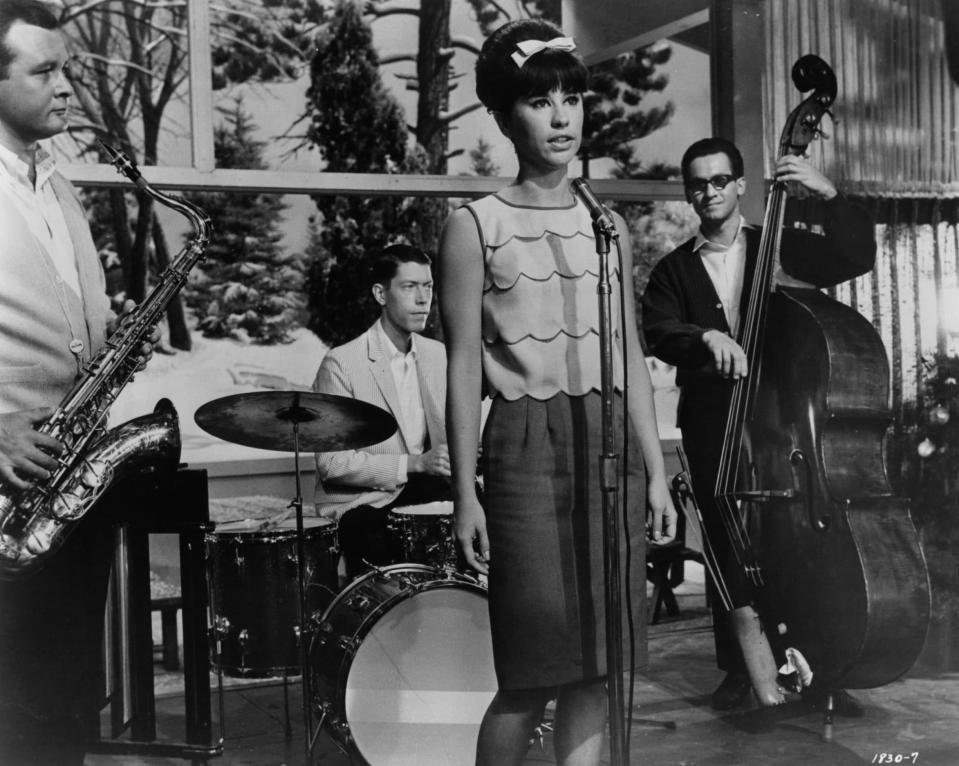Astrud Gilberto, singer who sent bossa nova around the world with her seductive rendition of The Girl from Ipanema – obituary

Astrud Gilberto, who has died aged 83, was the young German-Brazilian housewife drafted in as an impromptu bossa nova singer on The Girl from Ipanema (1964), which became one of the bestselling singles of the 1960s and turned the swaying Latin beat into an international craze.
The bossa nova (Portuguese for “new trend”) musical style was pioneered in the late 1950s by her guitarist husband João Gilberto and the composer Antônio Carlos Jobim. A mixture of samba and jazz, bossa nova numbers used cool melodies and harmonies, syncopated guitar chords and elliptical lyrics often sung in a seductive whisper, a sultriness that was to suit Astrud Gilberto perfectly.
Bossa nova moved into the mainstream when the American saxophonist Stan Getz and the guitarist Charlie Byrd recorded the chart-topping album Jazz Samba in 1962. The following year Astrud Gilberto, who had moved with her husband from Brazil to New York, accompanied him to a recording session for a new album with Getz which included a track called Garota de Ipanema (Girl from Ipanema – a seaside neighbourhood of Rio de Janeiro), written jointly by Jobim and Vinícius de Moraes.
After João Gilberto had sung the song in Portuguese, the producer Creed Taylor apparently decided that a version in English would boost the number’s American appeal. When Taylor learned that Astrud spoke English, he persuaded her into the studio, despite her never having sung professionally before.
There are different versions of the story. One scholarly account records that neither João Gilberto nor Getz had expected Astrud to be present at the recording session, and at first João argued against his wife’s participation. Astrud herself recalled that she had joined in during a rehearsal, with the result that both men insisted she sing on the recording. “This song,” Getz had told her, “is going to make you famous.”
In the event her fragile, whispered vocal above the hypnotic bossa nova sway of Stan Getz’s saxophone undoubtedly sealed the song’s success. Released as a single the following year, it established her as the pre-eminent bossa nova singer.

On recordings of other Jobim compositions such as Desafinado, and the wistful Corcovado (better known as Quiet Nights of Quiet Stars), Astrud employed her inimitable brand of saudade (yearning), her waif-like tones complementing Getz’s bittersweet romanticism.
With a voice “as faint and fragrant as wood-smoke at dusk”, as the Telegraph critic Peter Clayton put it, she demonstrated limited musical or emotional range, some even reckoning her vocals to be “totally tuneless”. When she reprised The Girl from Ipanema at concerts, as she did for the ensuing 40 years, it was in a cool, almost vibrato-less voice, but with what Clayton judged a “brilliant, laconic detachment”.
One of three daughters of a Brazilian mother and a German father, Astrud Evangelina Weinert was born on March 29 1940 in Salvador, capital of the Brazilian state of Bahia, and brought up in Rio de Janeiro. She married João Gilberto in 1959. Having debuted as a singer on the influential 1963 album Getz/Gilberto which sold more than a million copies and won a gold disc, her single, released the following year became, after the Beatles’ Yesterday, what is believed to be the most recorded pop song in history (Summertime from Porgy and Bess is the most covered song).
She recorded her first solo album, The Astrud Gilberto Album, in 1965. Although she began as a singer of bossa nova and American jazz standards, Astrud Gilberto went on to record her own compositions in the 1970s, singing in Portuguese, English, Spanish, Italian, French, German and Japanese. In 1976 her song Live Today (co-written with Jerome Schur), received an award at the Tokyo Music Festival.
In 1982 she formed a sextet that included her elder son, Marcelo, as bassist, and toured Europe, Japan, Canada and the US. She also enrolled at an American acting school, where she learned to control her chronic stage fright.
Having received the Latin Jazz USA award for lifetime achievement in 1992, Astrud Gilberto was inducted into the International Latin Music Hall of Fame in 2002. In 1996 she contributed to an Aids benefit album, duetting on Desafinado (Portuguese for “slightly out of tune”) with George Michael. Although she withdrew from public appearances in 2002, her version of Fly Me to the Moon was edited as a duet using a recording of the same song by Frank Sinatra for the soundtrack of the film romcom Down with Love (2003).

Although Astrud Gilberto flourished in the spotlight, her notoriously shy husband João became something of a recluse and the couple divorced in 1965.
In 1996 she broke a house record at the Jazz Cafe in Camden, north London, when tickets sold out on 12 consecutive nights. “At 55, she is still Top of the Pops,” one London critic reported.
In later life, Astrud Gilberto became a prominent campaigner for animal rights.
She never remarried. Her husband’s daughter by his second wife is the American singer Bebel Gilberto. Astrud Gilberto’s two sons survive her.
Astrud Gilberto, born March 29 1940, died June 5 2023

 Yahoo News
Yahoo News 
